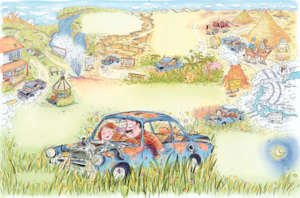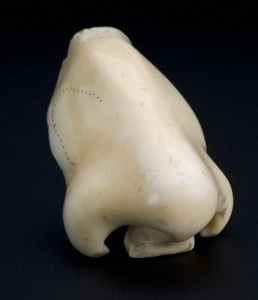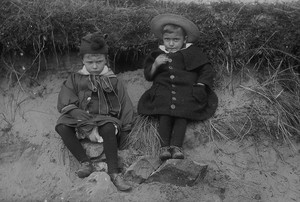Spark joy with these great picks from the CommonLit library
It is easy to forget with the rigorous demands of testing that reading also needs to be fun for students. As teachers, it’s our job to teach students how to read, and also to help them enjoy it — that’s the only way we are going to help students become lifelong readers.
That’s why we are bringing you these 10 funny and interesting CommonLit texts:
3rd-4th Grade
“Kissy Face” by Nancy Jean Northcutt
Your students will probably all relate to the protagonist in the story who hates to be kissed and pinched on the cheeks by adoring aunts and grandmas. To engage students even more, ask them to share stories about times when they have felt embarrassed by a relative.
“Poppy’s Jalopy” by Caroline Pignat

The speaker in this poem loves his dilapidated car nicknamed Jalopy. He and his grandfather think it’s perfect for their imaginative adventures. Use this fun poem to spark a discussion about the theme of beauty by asking:
Is beauty in the eye of the beholder? Why? Do you have something in your life that other people would see as old or broken-down but that you find beautiful?
5th-6th Grade
“The Night the Ghost Got In” by James Thurber
This story details a funny mishap when a boy mistakenly thinks a ghost got into the house. Pair this story with a humorous related video clip to help students better visualize the story.
For a creative extension lesson, have students journal about some of their childhood fears that turned out alright.
“Growing Down” by Shel Silverstein

This poem is a delightful twist on adulthood by suggesting the idea of growing down instead of up. There are several fun related media pairing suggestions that go well with this story. Show students the comical video “Adults Acting Like Toddlers” and ask them:
What would it be like if the adults in your life suddenly started acting like children? What traits do you attribute to childhood? Do you think there are some childlike traits that adults should adopt to lead happier lives? If so, which ones?
7th-8th Grade
“They’re Made Out of Meat” by Terry Bisson
This humorous story is told from the perspective of aliens looking down on Earth. Check out the suggested discussion questions to start an engaging class dialogue:

Throughout the story, the aliens constantly refer to “meat” in a negative way. What does meat represent in this story? Why do you think the author chose “meat” for this representation?
For a creative extension lesson, have students pick a serious issue and write about it through the lens of an alien. What would aliens have to say about topics like war, peer pressure, or greed?
“Ruthless” by William DeMille
In this engaging short story, a man sets a trap for a thief. Students will love discussing the risks of taking justice into one’s own hands. This is also a great story to kick off an entire true crime unit! Try pairing this text with with Roald Dahl’s “Lamb to the Slaughter,” and spark a discussion about guilt and murder.
9th-10th Grade
“Wealthy Teen Nearly Experiences Consequences” by The Onion Staff
This piece is a great introduction to satire, and one that will likely have students laughing out loud. At its core, the piece is an exploration of a serious topic: the abuse of power and wealth.
“The Nose” by Nikolai Gogol

In this farce, an official’s nose disappears and begins a life of its own. Ask students to think critically about the author’s exaggerations and his broader message. Then, lead a discussion around the author’s use of comedy with our suggested question:
What can we learn from comedy in the context of “The Nose”?
Creative extension lesson: have students watch the related media video “Le Nez” and create their own cartoon storyboard of Gogol’s farce.
11th-12th Grade
“A Modest Proposal” by Jonathan Swift

This is a classic example of satire by the master of satire, Jonathan Swift. In “A Modest Proposal,” Swift suggests a morbid solution to the issue of poverty plaguing Ireland in the 18th century. This is an old text, but students will love it for its absurdity and shock value.
Creative extension lesson: show students the artwork from the related media. Then, have them write their own satirical solution to a modern problem in their own lives or neighborhoods with accompanying artwork.
“The Metamorphosis” by Franz Kafka
Students will really enjoy this classic story of a man who wakes up one day as an insect. This is a perfect introduction to magical realism, a type of literature where the author blurs the line between what’s real and what isn’t. As students read, pause occasionally to ask students to discuss how the author uses language to help us accept reality.
Next Steps
Are you a teacher looking for more great content on CommonLit? Browse the CommonLit Library or come to one of our webinars!
If you are an administrator looking to leverage CommonLit in your school or district, our partnerships team can help. We offer benchmark assessments, professional learning, and more!


